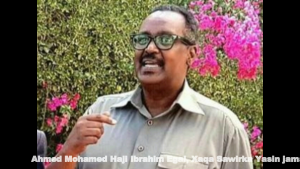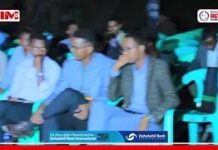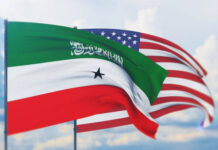Maqaal Xasaasiya oo u Warbaahinta Caalamka uu ku Daabacay Wiil u dhalay Madaxweynihii hore Somaliland Maxamed X. Ibraahin Cigaal, waxa uu eedo Huwiyey Xukuumadii Siilaanyo, halka uu Talooyin dhaxal-gal ahna usoo jeediyey Madaxweyne Muuse Biixi, maqaalkan oo ku qoran Luuqada Inglish halkan kaga bogo
The Poisoned Chalice & the Sabotage of Somaliland
The reference to a “poisoned chalice” was most notably used in Act I, Scene VII of Shakespeare’s Macbeth, when Macbeth is contemplating the consequences of murdering King Duncan. Macbeth broods as follows: “…that we but teach bloody instructions, which, being taught, return to plague the inventor: this even-handed justice commends the ingredients of our poison’d chalice to our own lips.” With respect to the usage of the phrase herein, while the “inventor” of the “bloody instructions” or “poison’d chalice” is the previous Kulmiye government of President Silanyo, the real victims of imbibing the said chalice are the people of Somaliland which had voted the said government into power and are left to suffer the consequences of its actions.
As we approach this first anniversary of Muse Bihi’s assumption of the Presidency of Somaliland, we must ask what the future has in store for the country. It is an undeniable fact that the previous administration has passed on to its successor a poisoned chalice regarding the almost uniformly negative legacy they have bequeathed with respect to both the domestic and foreign consequences its policies. The government of Muse Bihi has succeeded the most corrupt, most cynical and most divisive government in the short modern history of Somaliland. Accordingly, the vast majority of the people were happy that a new leadership assumed power on 13 December 2017 in the expectation that there would a major change in the outlook for the country, not to mention a complete overhaul of domestic politics from division and tribalism towards unity and reconciliation which have been the country’s ethos and the foundation of its national success in an increasingly fractured and restive region.
This expectation was occasioned, in large part, because of perceived differences between the new President and his predecessor despite the fact that they were both Kulmiye Party stalwarts and candidates. Firstly, Muse is perceived as a staunch nationalist who is irrevocably committed to Somaliland’s independence; whereas his predecessor’s commitment to this cause was called into question by his own public statements during the 2010 presidential campaign, not to mention his pro-federalist positions during the SNM struggle. Secondly, Muse was not directly implicated in the blatant and naked corruption of the Silanyo government whereby the senior members of the regime enriched themselves through the exercise of their official powers, so the new President assumed office with the perception of ‘clean hands’. Thirdly, Muse was known as a strong leader willing to take hard decisions and unwilling to suffer fools; whereas his predecessor had been ill for much of his term and was indeed largely absent from day-to-day management of national affairs which had become delegated, perforce, to a ‘kitchen cabinet’ of family members and senior government officials.
The components of this poisoned chalice can be summarised as follows:
- With respect to foreign policy, the previous government severely compromised the country’s strong independence stance by entering into a pointless and counter-productive policy of dialogue with the successive, illegitimate and unrepresentative so-called governments in Mogadishu. By conferring some level of legitimacy upon these rogue, foreign sponsored regimes in Mogadishu under the aegis of the so-called dialogue, the Silanyo government had commenced the process to subjugate Somaliland’s quest for recognition to the whims of the reigning regime in Mogadishu.
- In addition, the Silanyo government deliberately sabotaged the campaign for international recognition by abandoning it as the focus of its foreign policy. Instead, foreign policy was focused upon maximising foreign aid receipts and the marketing of national assets for the enrichment of government officials and their acolytes. When this effort required the subordination of the country’s national interest to the dictates of the Mogadishu ‘government’ of the day, this was accepted. Thus, for example, Somaliland students wishing to apply for the foreign scholarships extended by donor countries had to travel to Mogadishu in order to do so; while Somaliland Haj pilgrims had to travel to the holy sites as part of the Somalia delegation since no serious effort to secure Saudi agreement to a Somaliland delegation was made or even contemplated.
- The assault of the Silanyo administration upon Somaliland’s independence stance are also evident in the deliberate downgrading of the creditable achievements of the Egal and Rayalle governments in securing key supporters for the country throughout Africa, e.g. Ethiopia, Kenya, Ghana, South Africa and Senegal. Instead, countries with an avowed hostility to Somaliland’s quest for recognition, such as Turkey, were actively wooed and their overt attempts to compel Somaliland’s acquiescence to Mogadishu’s sovereignty accommodated, and even quietly encouraged.
- With respect to national security and domestic unity, the alienation of the majority population in the Sool & Sanag regions through the naked, tribal and divisive support of the President’s clan in land & pasturage disputes with other resident communities in these regions has resulted in exacerbating divisive feelings in these key border areas. The overt tribalistic tendencies of the Silanyo government, evidenced by the loud trumpeting of its tribal “Cheegaan” alliance by its Isaaq stalwarts and supporters, have lead to the splintering of the unity and national ethos that it had inherited from the two previous administrations.
- With respect to economic policy and financial strategy, the Silanyo government effectively abandoned any effort at developing and enacting any policy at all. It left economic and financial affairs to the whims and dictates of its major donors and supporters in the business community, thereby abrogating its statutory responsibilities. Indeed, the only significant action the previous government took with respect to the economy was to impose sales taxes and increase customs duty which hurt the small traders as well as impose income taxes which hurt public sector employees. The Silanyo government also failed to take advantage of the lifting of the livestock ban by the Arab Gulf states to implement procedures and regulations to both modernise and streamline the sector to prevent future bans and also to bring it within the control of local authorities and local stakeholders, i.e. pastoralists, merchants and exporters. Instead, the entire livestock sector was delivered into the hands of a few foreign, principally Saudi, merchants which have a key interest in keeping the local players weak, divided and disorganised.
Thus, Muse Bihi has inherited a toxic brew of (an arguably treasonous) subjugation to Mogadishu; regional & international isolation and subservience to foreign donors and investors externally; a worsened security situation in the eastern regions and increased fragmentation and social frictions domestically with a negative economic environment characterised by high inflation and rapidly depreciating currency. This is the poisoned chalice that the current Kulmiye government has inherited from its predecessor. It is a mammoth task to overcome the major wounds inflicted upon the country by the previous government and it will require a sustained national effort to effect the changes required; nevertheless, this is what the situation requires and what the people of Somaliland expect from their new government.
This mission will require skill, tenacity, patience and true patriotism from Muse Bihi and his team. The new President’s patriotism and patience are not in question and he must assemble a team with the requisite skills, tenacity and public spirit to work with him to bring the country back on track. The single greatest asset the new administration has is in the patience and political maturity of its people which have consistently chosen to protect their hard won peace and independence in the face of all provocations by internal and external forces seeking to subvert their wishes. Muse and his government must proven themselves equal to the task facing them and thus worthy of the support they have secured at the ballot box.
It is most disturbing that Muse Bihi and his government have not undertaken any significant initiatives, domestically or externally, to address and reverse the disastrous policy outcomes listed above. One calendar year is more than sufficient to at least commence the process of mitigating and overcoming the obstacles to the country’s continued progress, yet there has been no concerted effort to design, espouse and implement such a strategy. This lack of a coherent and effective strategy to address the nation’s negative position, externally and domestically, has not gone unnoticed by the public as well as by Somaliland’s enemies. This is demonstrated by the increasing groundswell of frustration domestically as many voices are being raised imploring the government to take corrective steps, as well as by the growing assertiveness of the Mogadishu regime in confronting Somaliland militarily as well as diplomatically at every turn. Muse Bihi and his government must take this matter to heart and treat it as the national security issue that it is since nothing less than the independence, not to mention the very existence, of Somaliland is at stake.
Ahmed M.I. Egal
November 2018



















